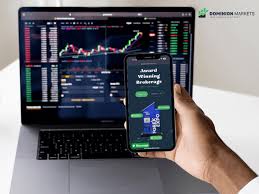
If you are new to the world of forex trading, you may have come across the term “demo forex trading account” while researching ways to get started. A demo account can play a crucial role in your trading journey by providing a risk-free environment to practice and develop your skills. In this guide, we will explore the concept of demo accounts, their advantages, how to choose the right one, and tips for making the most of your practice time. Check out demo forex trading account https://trading-ph.com/ for more insights.
What is a Demo Forex Trading Account?
A demo forex trading account is a type of trading account offered by brokers that allows you to trade with virtual money rather than real funds. This means that you can practice trading strategies, learn how to use trading platforms, and get a feel for the forex market without putting your hard-earned money at risk. Demo accounts are equipped with the same features and tools available on live accounts, allowing you to simulate real trading conditions.
Why Use a Demo Account?
There are several compelling reasons to use a demo forex trading account:
- Risk-Free Learning: The most significant benefit of a demo account is the ability to learn how to trade without the risk of losing real money. This is ideal for beginners who are just starting to learn the ropes.
- Familiarization with Trading Platforms: Every broker has its own trading platform. A demo account allows you to explore the interface, tools, and features of the platform before committing to a live account.
- Testing Strategies: You can experiment with different trading strategies, indicators, and techniques to see what works best for you without the fear of losing money.
- Building Confidence: With the knowledge and skills you gain from practicing on a demo account, you can build confidence before moving to a real trading environment.
- No Time Limit: Most demo accounts do not have a time limit, allowing you to practice at your own pace until you feel ready to transition to live trading.
How to Choose a Demo Forex Trading Account
When selecting a demo account, several factors should be considered to ensure you get the best experience:
- Broker Reputation: Choose a broker with a solid reputation and positive reviews. Look for regulatory compliance to ensure reliability.
- Platform Features: Opt for brokers that offer advanced trading platforms with the tools you need to practice effectively.
- Account Conditions: Be aware of the trading conditions on the demo account, such as leverage, spreads, and the available trading instruments.
- User Support: Good customer support is essential, even for demo accounts. Look for brokers that offer responsive support channels.
- Realistic Conditions: Choose a demo account that closely simulates real market conditions to give you a more accurate trading experience.
Tips for Maximizing Your Demo Trading Experience

To get the most out of your demo forex trading account, keep the following tips in mind:
- Treat It Like a Real Account: Approach your demo trading as if it were a real account. Set trading goals, analyze the market, and make well-informed decisions.
- Keep a Trading Journal: Record your trades, thoughts, and strategies in a journal. This will allow you to reflect on your performance and identify areas for improvement.
- Practice Risk Management: One of the most crucial aspects of trading is risk management. Use your demo account to practice setting stop-loss and take-profit levels effectively.
- Test Different Strategies: Don’t hesitate to experiment with various trading strategies to see what works best in different market scenarios.
- Transition to Live Trading Gradually: Once you feel confident in your abilities, consider transitioning to a live account with smaller investments to minimize risk.
Common Mistakes to Avoid
As with any learning process, it’s essential to be aware of common pitfalls that traders encounter while using demo accounts:
- Ignoring Strategy Development: Some traders treat demo accounts as a gambling platform rather than taking the time to develop a solid trading strategy.
- Relying on Unrealistic Gains: Remember that profits in a demo account do not guarantee similar results in a live account. Keep your expectations realistic.
- Overtrading: It can be tempting to take numerous trades in a demo account. Instead, focus on quality over quantity and select your trades carefully.
- Delaying Transition to a Live Account: While practice is vital, spending too much time in a demo account may hinder your ability to transition to live trading. Know when it’s time to make the switch.
The Transition to Live Trading
Once you feel comfortable and confident in your trading skills, it’s time to take the leap into a live trading account. To make this transition smoother, consider the following:
- Start Small: Begin with a smaller amount of capital that you can afford to lose. This strategy allows you to gain experience without significant financial risk.
- Implement What You’ve Learned: Utilize the strategies and risk management techniques you practiced in your demo account.
- Stay Disciplined: Emotional trading often leads to poor decisions. Stick to your trading plan and maintain discipline throughout your trading journey.
- Continue Learning: The forex market is dynamic and constantly evolving. Make it a habit to continue learning and adapting to new market conditions.
Conclusion
A demo forex trading account is an invaluable tool for anyone looking to improve their trading skills without financial risk. By understanding how to effectively use a demo account, you can build the necessary foundation for a successful trading career. Take advantage of the opportunity to practice and refine your strategies, and remember that disciplined practice can lead to substantial rewards in live trading.
]]>